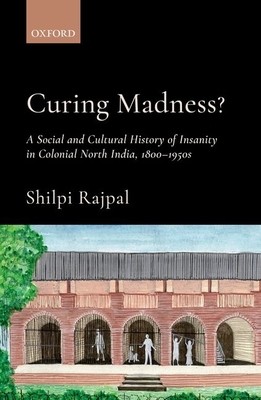
- We will send in 10–14 business days.
- Author: Shilpi Rajpal
- Publisher: Oxford University Press, USA
- ISBN-10: 0190128011
- ISBN-13: 9780190128012
- Format: 15 x 22.4 x 2.5 cm, hardcover
- Language: English
- SAVE -10% with code: EXTRA
Reviews
Description
Curing Madness? focusses on the institutional and non-institutional histories of madness in colonial north India. It proves that 'madness' and its 'cure' are shifting categories which assumed new meanings and significance as knowledge travelled across cultural, medical, national, and regional
boundaries.
The book examines governmental policies, legal processes, diagnosis and treatment, and individual case histories by looking closely at asylums in Agra, Benaras, Bareilly, Lucknow, Delhi, and Lahore. Rajpal highlights that only a few mentally ill ended up in asylums; most people suffering from
insanity were cared for by their families and local vaidyas, ojhas, and pundits. These practitioners of traditional medicine had to reinvent themselves to retain their relevance as Western medical knowledge was widely disseminated in colonial India. Evidence of this is found in the Hindi medical
advice literature of the era. Taking these into account Shilpi Rajpal moves beyond asylum-centric histories to examine extensive archival materials gathered from various repositories.
EXTRA 10 % discount with code: EXTRA
The promotion ends in 17d.17:03:45
The discount code is valid when purchasing from 10 €. Discounts do not stack.
- Author: Shilpi Rajpal
- Publisher: Oxford University Press, USA
- ISBN-10: 0190128011
- ISBN-13: 9780190128012
- Format: 15 x 22.4 x 2.5 cm, hardcover
- Language: English English
Curing Madness? focusses on the institutional and non-institutional histories of madness in colonial north India. It proves that 'madness' and its 'cure' are shifting categories which assumed new meanings and significance as knowledge travelled across cultural, medical, national, and regional
boundaries.
The book examines governmental policies, legal processes, diagnosis and treatment, and individual case histories by looking closely at asylums in Agra, Benaras, Bareilly, Lucknow, Delhi, and Lahore. Rajpal highlights that only a few mentally ill ended up in asylums; most people suffering from
insanity were cared for by their families and local vaidyas, ojhas, and pundits. These practitioners of traditional medicine had to reinvent themselves to retain their relevance as Western medical knowledge was widely disseminated in colonial India. Evidence of this is found in the Hindi medical
advice literature of the era. Taking these into account Shilpi Rajpal moves beyond asylum-centric histories to examine extensive archival materials gathered from various repositories.


Reviews